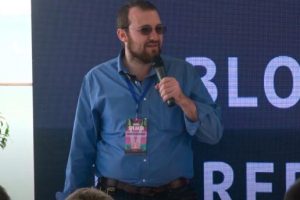Cardano ($ADA): What To Expect From Smart Contract Rollout During Next 3 Months

Recently, Charles Hoskinson, Co-Founder and CEO of IOHK, gave an overview on the work being done now — and that being done over the next three months — that will lead to the launch of smart contract functionality on Cardano’s mainnet.
Before we talk about the key takeaways from Hoskinson’s latest update on Cardano, which came in the form of a video released on his YouTube channel, it might be useful to provide some background information (sourced from the Cardano Foundation website).
What is Plutus?
“One of the goals for the Goguen era has been the creation of Plutus, a purpose-built smart contract development language and execution platform using the functional programming language Haskell. Plutus is already available for testing and brings the benefits of functional programming to smart contract creation. It also allows one code base to support both on and off-chain components, improving the coherency and usability of the development experience compared with existing smart contract implementations.“
What is the Plutus Pioneer Program?
“It is a program to recruit and train developers in Plutus for the Cardano ecosystem. When you join this program, you will become part of a group with early access to a set of courses that teach you the core principles of how to code in both Haskell and Plutus. It will be highly interactive, with weekly videos, exercises, and Q&A sessions, along with exclusive access to the creators and key experts in the language. You will also be able to join a dedicated community channel, created to help pioneers connect to each other as you learn.“
The first ten-week program “started in early April and will run through to mid-June.” The Cardano Foundation may “open up a second cohort this summer.”
What is Marlow?
“The Goguen era also encompasses work to make Cardano accessible to wider audiences via Marlowe, allowing financial and business experts with no previous technical knowledge to create smart contracts. Marlowe is a high-level, domain-specific language (DSL) for financial contracts which is built on Plutus. Marlowe comes with the Marlowe Playground, an easy-to-use application-building platform that non-programmers can use to build financial smart contracts.
“Together, Marlowe and the Marlowe Playground simplify the process of creating smart contracts for financial applications, allowing subject matter experts to directly contribute without requiring deep programming skills. The combination of Plutus and Marlowe will enable a new class of enterprise-level smart contracts with verified functionality, capable of underpinning large scale implementations in the real world.“
And now, let’s go over some of the main highlights from Hoskinson’s video, which was effectively a teaser for the May 2021 edition of the Cardano 360 Monthly Update Show, which will be streamed live on YouTube at 16:30 UTC on May 27:
Key Takeaways From Hoskinson’s Latest Update
Around 1500 people are participating in the Plutus Pioneer Program:
“The point of the program was to create a baseline so that when Alonzo comes basically we have a cohort of people to go and play around with it, run code, kind of like what we seeded with the incentivized testnet for the development of stake pool operators.
“So now that that program is coming to an end, the first step — and I think we call this Alonzo Blue — is we’re going to roll a chunk of those Plutus pioneers, the high performers, alongside eight different development companies, into an alpha testnet. And the point of this is just to make sure that all the integrations are right and to run actual Plutus code on the system. And it’s a basically an acid test and a dry run to get a greater understanding if everything we think is true is true. And we’ll burn that in for a little while with that first cohort.“
There are also eight development companies working with IOHK that “came in on fixed cost contracts.” Their job is to “go and write Plutus code and build Plutus applications as tests and tutorials to get a better pedagogical understanding of all the design patterns and techniques and common bugbears and so forth.” This is basically what is happening in the next 30 days.
Once stability has been achieved and “the network is really looking solid,” the plan is for IOHK to “upgrade the public testnet through a hard fork combinator event to basically run all the Alonzo stuff.”
After this has been running for, say, a few days, IOHK will “begin discussions with integration partners,” which are “exchanges, wallets, custodians, and anybody else who’s running Cardano infrastructure at the moment,” and they will be told “hey, you guys need to integrate against the tetsnet because things are moving very quickly.”
Also, “the next wave of Plutus people will be rolled into that public testnet,” and the goal is “to provide enhanced support.”
And finally, as we get close to the end of the last 30-day period, the goal for IOHK is “to start having that reasonable conversation of strategy for when and how to do a hard fork combinator [event].”
https://youtube.com/watch?v=u6negi1yAQQ%3Fstart%3D101%26feature%3Doembed
DISCLAIMER
The views and opinions expressed by the author, or any people mentioned in this article, are for informational purposes only, and they do not constitute financial, investment, or other advice. Investing in or trading cryptoassets comes with a risk of financial loss.
Source: Read Full Article
